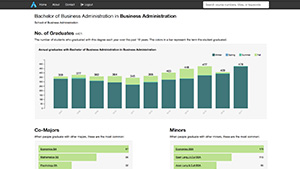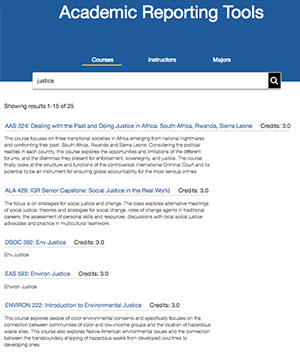Amy Homkes-Hayes, Lead Innovation Advocate
A Brief History
 Academic Reporting Tools, known as ART 2.0, was brought into the Digital Innovation Greenhouse (DIG) by faculty champion, Dr. August Evrard, Arthur F. Thurnau Professor of Physics and Astronomy. ART 2.0 provides the Michigan community with views of the University’s curricular history manifested in several ways. In other words, we like to think of ART 2.0 as housing virtual decks of cards: one for courses, another for instructors, and so on. Since March 2016, CourseProfile has enabled students to view course history on things like enrollment by school or college, majors of students who took the course, pre/concurrent/post course selections, a subset of Student Evaluation of Teaching (SET) questions on topics like the perceived workload of the course, and how much the course increased interest in the subject. Starting in November 2016, the InstructorInfo deck has enabled students to view a subset of SET questions on topics like preparedness and clarity.
Academic Reporting Tools, known as ART 2.0, was brought into the Digital Innovation Greenhouse (DIG) by faculty champion, Dr. August Evrard, Arthur F. Thurnau Professor of Physics and Astronomy. ART 2.0 provides the Michigan community with views of the University’s curricular history manifested in several ways. In other words, we like to think of ART 2.0 as housing virtual decks of cards: one for courses, another for instructors, and so on. Since March 2016, CourseProfile has enabled students to view course history on things like enrollment by school or college, majors of students who took the course, pre/concurrent/post course selections, a subset of Student Evaluation of Teaching (SET) questions on topics like the perceived workload of the course, and how much the course increased interest in the subject. Starting in November 2016, the InstructorInfo deck has enabled students to view a subset of SET questions on topics like preparedness and clarity.
Since course cards are linked to several school and college course guides, accessible via Wolverine Access, and through the ART 2.0 homepage (art.ai.umich.edu), it makes it easy for students to use ART 2.0 when backpacking and registering for courses. ART 2.0 provides access to information U-M students may use to help explore what kind of courses to take, discover useful data on courses and instructors, and help decide, ultimately, what classes to enroll in based on their academic, personal, and professional goals.
Exciting New ART 2.0 Developments
 As we continue to iterate on features for ART 2.0, we think about, and seek feedback on, what additional “card decks” would aid student course exploration and decision making. It’s with this frame in mind that we are excited to announce the next iteration in ART 2.0, MajorMetrics. MajorMetrics is a milestone for ART 2.0 by offering undergraduate major and minor information to the U-M community. Each MajorMetrics card includes a timeline of how many students have graduated with a particular degree (referred to as majors for undergraduate students) spanning the past 10 years. We have also included statistics on joint degrees (co-majors) and minors. We hope, like CourseProfile and InstructorInfo, MajorMetrics will enable students to conduct research on majors and minors they are interested in, or have already declared, using a rich data set.
As we continue to iterate on features for ART 2.0, we think about, and seek feedback on, what additional “card decks” would aid student course exploration and decision making. It’s with this frame in mind that we are excited to announce the next iteration in ART 2.0, MajorMetrics. MajorMetrics is a milestone for ART 2.0 by offering undergraduate major and minor information to the U-M community. Each MajorMetrics card includes a timeline of how many students have graduated with a particular degree (referred to as majors for undergraduate students) spanning the past 10 years. We have also included statistics on joint degrees (co-majors) and minors. We hope, like CourseProfile and InstructorInfo, MajorMetrics will enable students to conduct research on majors and minors they are interested in, or have already declared, using a rich data set.
In addition to MajorMetrics, we have substantially improved the search feature for ART 2.0. We now offer separate searching options by course, instructor, or degree, and the results are now presented in a more user-friendly fashion. We know giving students multiple pathways for searching courses, faculty, and majors contributes to their use of the tool, and we expect students will take advantage of these new search features as they backpack and register for Winter 2018 courses and beyond.
Like all our tools in DIG, ART 2.0 continues to evolve. Each production cycle brings fresh and innovative ways for students, faculty, and staff to view and use University data to enhance the experience and informed decision-making of curricular choices here at the University of Michigan.


